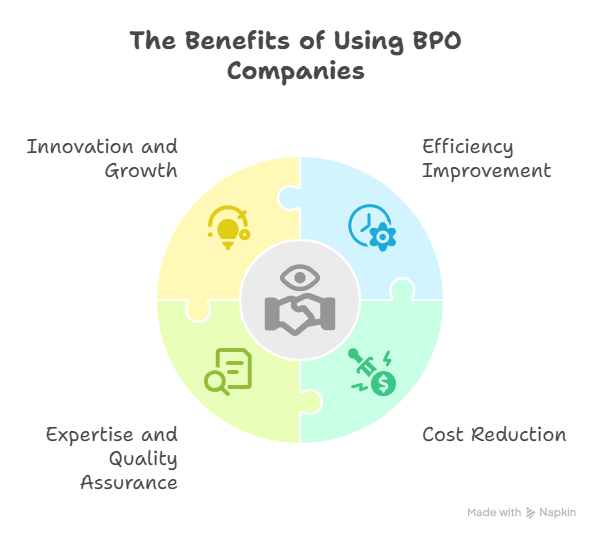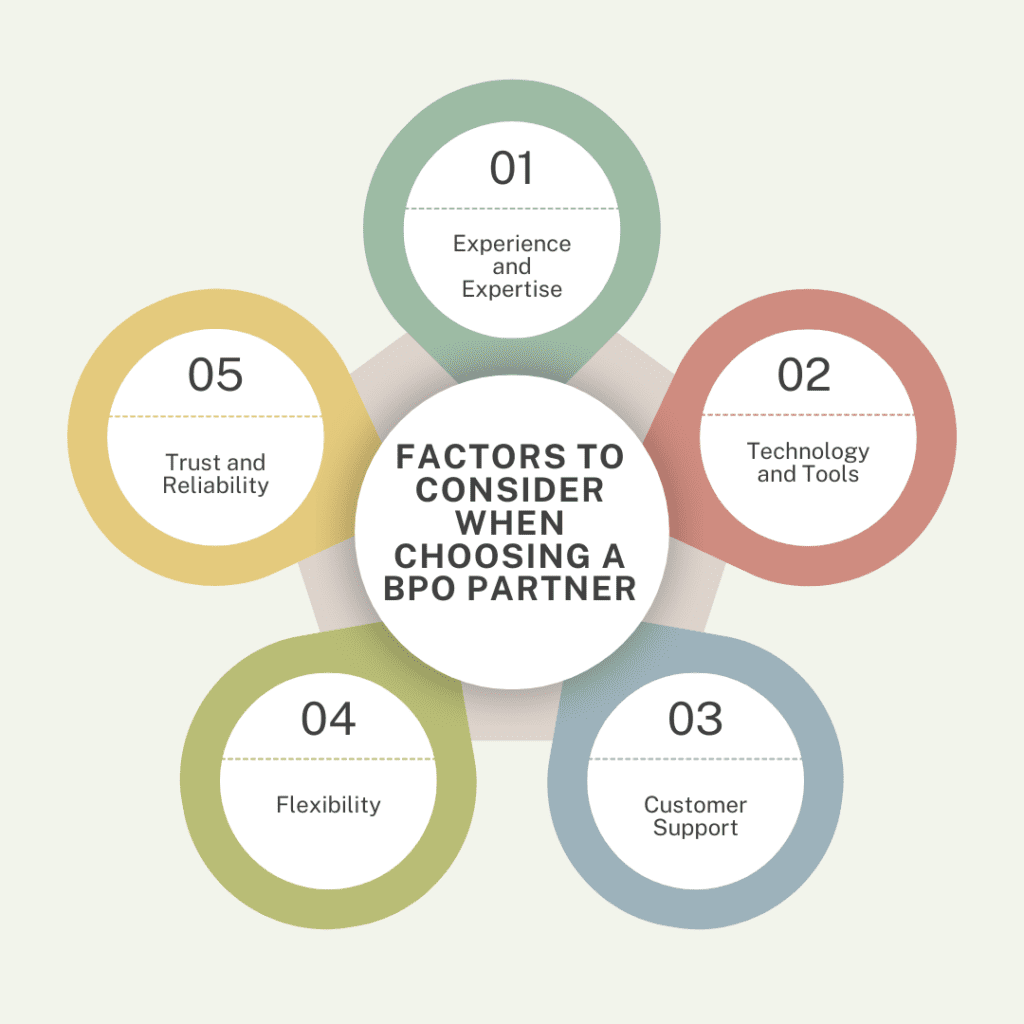What is a BPO Company and what do they do?
26 Nov 2024 By: Mary Dellosa
Updated

BPO companies are a big help for businesses today. This article explains what does BPO company do, how does BPO work, and their pros and cons. Let’s now understand what is a BPO company and what do they do?
What is a BPO Company?
Business Process Outsourcing (BPO) is when you hire others to handle tasks outside your main work. The services mentioned can either be provided locally or internationally. It enables you to concentrate on the most important things while the professionals take care of the other things. You would be able to free up some time, lower your anxiety levels, and be confident that the work is taken care of properly.
What is The Concept of Business Process Outsourcing?
With the help of BPO, companies can delegate activities such as customer support, bookkeeping, PPC, and HR to specialists. It enables firms to tap into expertise and equipment that are not available internally. Companies that outsource their operations can simplify processes and at the same time, get new ideas and be more responsive. This very ability to switch fast in and out of different business processes is a powerful facilitator of growth, creativity, and overall better performance.
What are the Different Types of BPO Services?
BPO services come in two types: front-office and back-office. Front-office covers customer tasks like tech support and sales, while back-office handles things like payroll and billing, often supported by tools such as an online wagestub generator to simplify and automate pay processing. Insurance BPO services are also a growing segment, helping companies with claims processing, policy administration, and customer support. Outsourcing IT is one more major segment of BPO. Organizations recruit professionals to take over IT activities such as software development or network installation thus, reducing costs and getting the best-skilled people.
IT outsourcing has been revolutionized by cloud computing. It enables organizations to use flexible and on-demand solutions for better work, collaboration, and data management among teams. Tech development will trigger continuous evolution of BPO, namely, the application of AI and machine learning will not just enhance the processes but also quicken the decision-making for businesses through better choices.
The Inner Workings of a BPO Company
BPO companies leverage cutting-edge technology and well-established methods to yield superior results. This not only helps businesses to concentrate on their core activities but also to accelerate their growth.
They adhere to very strict rules and also make the employees undergo quite some training to guarantee quality. The training comprises a lot of practical work in real life which makes the staff ready to meet a wide range of customer requirements.
Such a method guarantees the delivery of services that are constant and trustworthy which is very important nowadays in the highly competition world. BPO companies enable businesses to remain efficient, creative, and customer-oriented.
The Role of Technology in BPO Operations
BPO relies heavily on technology. The firms perform their operations through the use of automated software, which not only fastens the process but also minimizes human errors. Technology also helps in communication and sharing of data. Cloud platforms offer instantaneous updates, thereby keeping the entire workforce connected regardless of their locations. All the workers are in sync and thus their productivity is enhanced.
AI and machine learning also boost BPO. They do data analysis, foreseeing demand of customers and giving better services. AI chatbots takes care of uncomplicated questions, which means that human agents will be available for more complicated issues. This not only fastens the response time but also enhances the customer experience, capability of clients getting prompt and efficient support all the time is guaranteed.
What is The Process of Outsourcing Business Tasks?
Outsourcing begins with pinpointing duties that can be entrusted to others. Companies proceed to select a BPO partner by evaluating skills, standing, and fees. They evaluate the collaborator’s tech and sector know-how to confirm compatibility. Thorough investigations assist in locating a provider that caters to particular requirements.
Next comes negotiation and signing a contract. Then, the BPO team assumes the responsibility for the tasks during a transition period that comprises training in the company’s requirements and objectives. Continuous monitoring and feedback guarantee quality. Performance indicators assist in measuring success and facilitating improvements which in turn, make the partnership robust and efficient.
The Benefits of Using BPO Companies
BPO companies bring many benefits. Efficiency gets improved which allows companies to concentrate on the most important aspects of the business. Companies, through outsourcing, manage to reduce the time used to accomplish a task and thus, productivity is increased.
Additionally, cost-cutting is a major benefit in outsourcing. The whole process of hiring and training the non-skilled personnel for other sectors has been eliminated thereby cutting down the overall costs and assisting companies in making quick changes to the market.

Cost Efficiency and BPO
Cost efficiency is a key reason businesses choose BPO. Outsourcing saves on labor and office costs, especially with virtual solutions in today’s remote work era.
This gives way to the allocation of funds for expansion. In addition to this, companies are able to put money into the research and development of new products and so on thereby remaining in the race and catering to the customers’ changing needs and preferences along with the market trends.
Expertise and Quality Assurance in BPO
The BPO services are rich in professional know-how. The service providers engage a team of talented people who not only perform work of the highest quality but also provide superb customer service. In certain areas like IT and support, the professionals utilize the most modern tools and techniques for better results and happier customers. Such skills are the assurance of quality.
Moreover, BPO businesses are employing very rigid quality-check measures. They have audits and performance metrics in place to gauge their progress and uphold the standards. This creates a formal relationship of trust, allows for the processes being managed properly, and leads to constant improvement which in turn provides confidence to the business relying on the partnership.
What are the Potential Challenges with BPO Companies?
BPO has numerous advantages but at the same time it also presents some challenges which may hinder its success. They have to be dealt with through proper planning and mindfulness.
Understanding these difficulties will enable the firms to be more well-prepared, to tackle the issues at a more preliminary stage, and to generate the accurate solutions that would render the whole outsourcing procedure trouble-free.
How to Overcome Communication Barriers?
Communication difficulties are part and parcel of BPO. Time differences and cultural diversity are some of the factors leading to misunderstandings. The existence of clear lines and constant communication is really important.
The use of collaborative instruments such as video conferencing and project management software eliminates the gaps. The practice of providing honest feedback coupled with regular meetings promotes trust and keeps the teams working in the same direction.
Managing Data Security in BPO
The issue of data protection is one of the most important things that companies worry about when they outsource. It is the company’s responsibility to make sure that their confidential information is secure with those BPO providers having reliable security measures.
The non-stop audits and compliance checks will always be there to ensure the protection of data. Teaching employees both in-house and outsourced about the measures to be taken for the safety of data will not only minimize the risks but will also foster the spirit of accountability.
Trending Now
The global business process outsourcing (BPO) market was valued at $280.64 billion in 2023 and is expected to grow at a 9.6% CAGR through 2030. BPO services, driven by cost reduction, enhanced service quality, and flexibility, enable businesses to focus on core activities while outsourcing non-core tasks. Key growth factors include the adoption of cloud computing, which enhances efficiency, reduces costs, and ensures 24/7 accessibility. Major industries leveraging BPO include healthcare, BFSI, IT, and retail, with rising demand for customer service and training to adopt new technologies like AI and RPA.
Regions like North America and Asia Pacific dominate the market due to advanced digital infrastructure and cost-effective labor. Countries like South Africa and India are emerging as key players, supported by government initiatives and skilled workforces. However, challenges such as data security concerns and intellectual property risks persist. The BPO sector is also experiencing increased M&A activity and rapid adoption of omnichannel strategies in industries like retail and telecom, further driving market expansion.
Choosing the Right BPO Company for Your Business
Choosing the right BPO company is key to successful outsourcing. Businesses should evaluate partners to ensure they align with their goals.
A thoughtful selection process builds strong partnerships and sets the stage for long-term success.
Key Factors to Consider

When choosing a BPO company, focus on key factors. First, check their expertise and industry experience. A proven track record is essential. Second, evaluate their technology BPO services. Advanced tools improve efficiency and service quality. Also, review their customer support for strong communication.
Consider cultural fit. Shared values and practices foster better collaboration. Look for flexibility and adaptability to handle changing business needs. Finally, review client testimonials and case studies to see how they’ve managed challenges similar to yours. A reliable BPO provider is key to success.
Understanding BPO Contracts and Agreements
Once you choose a BPO company, understanding the contract is crucial. It covers pricing, scope, and responsibilities, laying the foundation for the partnership. Read and negotiate terms carefully. Clear agreements prevent confusion and set both parties up for success.
Pay special attention to data security and confidentiality clauses, especially if sensitive information is shared. Ensure the provider has strong safeguards. Include performance metrics like SLAs to track results and define standards. These help align expectations and maintain accountability.
BPO offers valuable support. Knowing its benefits and challenges helps businesses make the most of these services.
Ready to enhance your business efficiency and focus on your core competencies? HelpSquad BPO is here to provide you with top-tier virtual assistants and round-the-clock customer service. Our bilingual agents are skilled in handling a variety of back-office tasks and customer support, all starting at an affordable $8.50 per hour. Don’t miss the opportunity to elevate your operations with HelpSquad’s professional outsourcing services. Start your trial today and experience the difference we can make!
What are the ways in which BPO contributes to the financial saving and efficiency of businesses?
BPO firms save money by not having to hire, train, and keep teams for non-core operations in-house, which are eventually added to the total cost of business. In addition to this, BPO companies usually set up operations in low-cost Labor areas and are capable of working quicker and with fewer mistakes through advanced tools and automation. As a result of the combination of specialized skills and technology, the efficiency is enhanced, the overheads are reduced, and the businesses that get the savings can then reinvest in innovation and growth.
What is a BPO firm and what services do they offer?
An organization that provides services as a BPO (Business Process Outsourcing) firm is one that commonly takes over specific, non-critical functions of clients’ businesses. These services can be, among others, customer care, tech support, accounting, HR, and IT help. Companies that turn to BPO firms discover that they can then free up their internal resources and focus on their core activities and strategic rise.
BPO services: what is the difference between front-office and back-office?
Front-office BPO takes part in customer interaction handling; thus, customer support, sales, providing help, and handling service inquiries are the main areas. Back-office BPO is dealing with the operations of the company that are not visible to customers such as payroll, billing, bookkeeping, data entry, policy administration, and IT support. The two functions work together to make sure that the company can still focus on its core activities while the business runs smoothly.
What technology influence in modern BPO operations?
Technology is essential in BPO. The providers implement automation, artificial intelligence, and cloud computing to increase the speed of their processes, lessening the errors and at the same time allowing real-time communication among the brigade. AI and machine learning are used for data analysis, customer need prediction, and operation of chatbots for handling basic queries, while human personnel are used for the more involved cases. Cloud computing is also used as a main medium of communication providing continuity in data security and access anytime hence leading to BPO services being dependable and extensible.
What difficulties might companies encounter with BPO services?
Among the most common obstacles are communication barriers (e.g., time differences, language, and culture), uncertainties related to data protection and privacy, and possibly clashing expectations or quality. Still, if a reliable partner is chosen, open and user-friendly communication channels and collaboration tools are applied, clear service-level agreements (SLAs) are set, and frequent audits and performance assessments are done, then these problems can be minimized.


